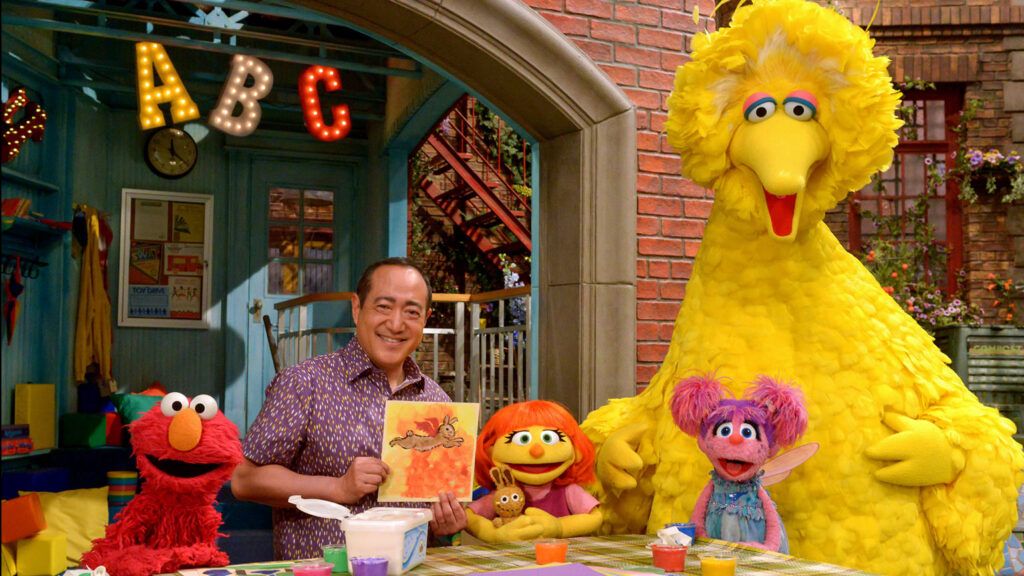There’s a new puppet coming to Sesame Street! On April 10, Julia, a a 4-year-old girl who is autistic, will join Elmo and the gang, giving more TV representation to children on the autism spectrum.
Julia was first seen a year and a half ago as part of the program’s “See Amazing In All Children” initiative, where she appeared as an animated character in eBooks and online.
“The response from the autism community to Julia was so overwhelming that we decided we would bring her to life on the show as well,” Sherrie Westin, the Executive Vice President of Global Impact & Philanthropy for Sesame Street tells Guideposts.org.
The show saw a need that wasn’t being met on TV and decided to do something about it.
“When we first set out to address the issue of autism, we had two goals,” Westin says. “One was to create tools and resources to help families with children with autism make every day moments easier. The other was to destigmatize autism and raise awareness and understanding.”
Writers and producers of the show worked with experts and advisers within the autism community to make sure they got Julia right, even going so far as specifically choosing to make her a girl to combat harmful stereotypes.
“We know that more often, boys are diagnosed on the spectrum than girls but because of that, we learned that a lot of people don’t think that girls can have autism. This was yet another opportunity to debunk the myths surrounding autism,” Westin explains.
When it was time to find the puppeteer who would bring Julia to life on the show, they found Stacey Gordon, an experienced puppeteer working with the Great Arizona Puppet Theater.
“I was in utter shock,” Gordon says of learning she would voice Julia just one year ago. “I was alone in my studio and had to call my husband and tell him but I had to calm down before I did so that I’d be able to dial our phone number.”
She grew up around puppets – her grandfather carved marionette dolls and her grandmother made her her first puppet when she was still a toddler – but she never expected to find herself on the PBS program.
“The funny thing is my parents always said, ‘When is Sesame Street calling?’ And I was doing my own thing in Arizona and I was like, ‘Mom, Sesame Street doesn’t call. They don’t know me,’” Gordon says. “Turns out, they email.”
Gordon felt a responsibility to get Julia right from the get go. Her own experience as the mother of a 14-year-old autistic son informed how she approached the character.
“Eye contact was a big thing,” Gordon explains. “In puppetry, not making eye contact is considered bad puppetry so it’s been a challenge to try to figure out how we walk that fine line between good puppetry and not making eye contact. One thing we’ve done is that we’ve given Julia a focal point and that’s her bunny, Fluffster, so that she can pay attention to her little friend.”
Julia also requires several assists – puppeteers who help Gordon move her arms and legs.
“There’s a whole team going into her,” Gordons says. “She’s already had so many people put their heart into her. I just got to add mine.”
Gordon hopes Julia can shed some light on an issue that rarely gets talked about, especially on TV. Her own child has experienced bullying and exclusion at school, mainly because his classmates and others don’t understand autism and how it presents.
“The saying is ‘If you’ve met one kid with autism, you’ve met one kid with autism,’” Gordon says. “It’s so true. Every single kid I know, autism presents differently for them. I think that Abby and Elmo and Big Bird and Julia and all of the characters on the show model acceptance. When kids see behavior modeled, they repeat that behavior.”
Gordon hopes Julia can present an opportunity for children to learn more about autism, for autistic children to see themselves represented in the media and for parents to start having needed conversations with their kids.
“I really hope that she can help destigmatize autism and can teach an entire generation of kids and families that autism is just another way of thinking,” Gordon says. “Kids with autism will enrich your life. They’re valuable people to have in your life. Include them because they are, not because you should. Include them because you will get so much from a relationship with them.”
For Westin, being able to provide awareness about autism to the children who watch the show is so important, especially as talk of defunding and government budget cuts loom.
“What’s very important to us is to reach all children,” Westin says. “Without PBS we would not be able to reach children who are less affluent, who can’t afford satellite or cable or other means. The fact that there are PBS stations in every part of the country is hugely important. Without PBS we wouldn’t be able to deliver on our mission which is to help all children grow smarter, stronger and kinder.”






